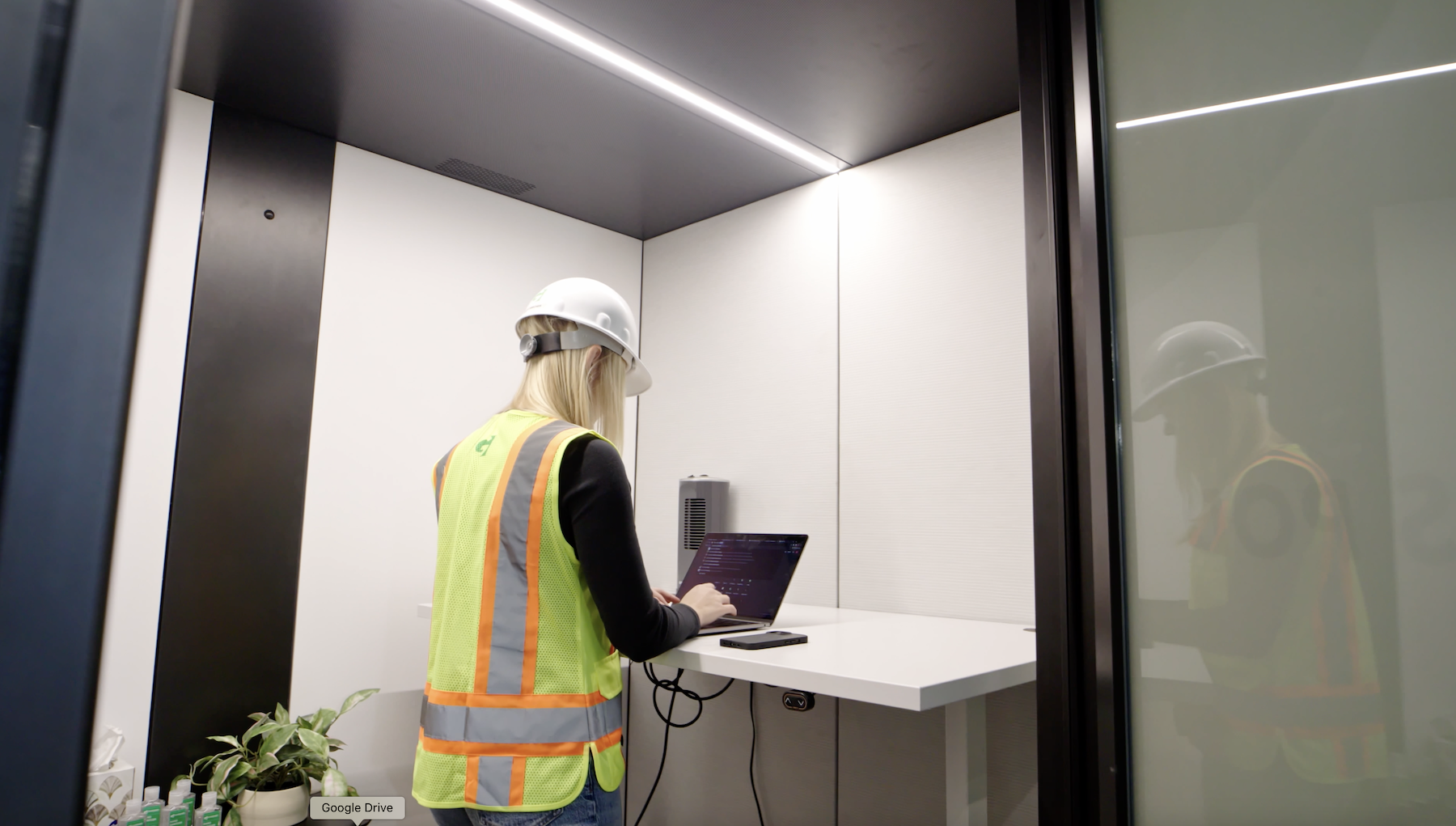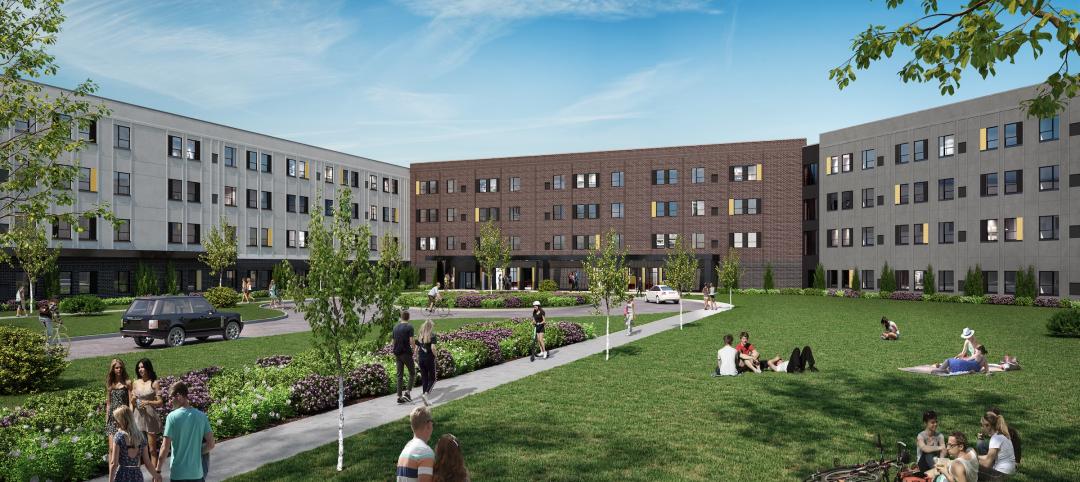The mental health of workers has emerged as an urgent topic within the construction industry, with firms considering the issue as part of their employee wellness initiatives.
One such firm is Minneapolis-based general contractor Gardner Builders. Three of its jobsites currently include Wellness Pods, 6x8-ft steel boxes that provide workers with a temporary, anxiety free sanctuary for private activities. The heated and cooled pods are wheelchair-accessible, with a mini fridge, desk and chair, and rug.
The concept for the pods dates back to last year, when Gardner Builders noticed that its employees engaged in activities that might be best served by having a private space to retire to. This need was expressed further during a meeting of the company’s internal Pulse group, which discusses employee concerns. A 20-year-old female laborer pointed out that she had nowhere to go while at work to pump breastmilk. “The idea for the wellness pod was borne from this,” says Jessica Stoe, Gardner Builders’ Brand, Wellness, and Marketing Director, and Wellness Pod Lead.
The first pods, built in May 2022, were small plywood boxes within Gardner’s offices. Stoe says the goal, then and now, was to create a place that is soundproof, comfortable, and accessible for everything from meditation, telehealth, privacy, and prayer. Based on worker feedback, most employees seem to be using the pods for private calls.
Future pods will be mobile

The pod is more of a concept than a static structure; some are on wheels, for example. Gardner has also partnered with the furniture supplier Teknion to develop its steel pod with a glass door. Stoe estimates that a plywood pod costs Gardner $3,000; the steel model runs between $12,000 and $16,000.
Right now, a jobsite’s foreman or superintendent handles the scheduling for using jobsite pods. Stoe says Gardner is looking into scheduling software similar to what office workers use to book meeting rooms.
Future iterations of the pods, says Stoe, are likely to be more mobile so they can be moved around a jobsite as needed. And Gardner is developing a ground-up, climate-controlled model for exterior use. That model, says Stoe, would have an iPad mounted to it that allows workers to schedule the pod themselves.
Gardner Builders has gotten inquiries about its Wellness Pods from the local YMCA and Chamber of Commerce, and wants to share the concept with other contracting firms.
Related Stories
Student Housing | Jun 25, 2024
P3 student housing project with 176 units slated for Purdue University Fort Wayne
A public/private partnership will fund a four-story, 213,000 sf apartment complex on Purdue University Fort Wayne’s (PFW’s) North Campus in Fort Wayne, Indiana. The P3 entity was formed exclusively for this property.
Sustainability | Jun 24, 2024
CBRE to use Climate X platform to help clients calculate climate-related risks
CBRE will use risk analysis platform Climate X to provide climate risk data to commercial renters and property owners. The agreement will help clients calculate climate-related risks and return on investments for retrofits or acquisitions that can boost resiliency.
MFPRO+ News | Jun 24, 2024
‘Yes in God’s Backyard’ movement could create more affordable housing
The so-called “Yes in God’s Backyard” (YIGBY) movement, where houses of worship convert their properties to housing, could help alleviate the serious housing crisis affecting many communities around the country.
Student Housing | Jun 20, 2024
How student housing developments are evolving to meet new expectations
The days of uninspired dorm rooms with little more than a bed and a communal bathroom down the hall are long gone. Students increasingly seek inclusive design, communities to enhance learning and living, and a focus on wellness that encompasses everything from meditation spaces to mental health resources.
Museums | Jun 20, 2024
Connecticut’s Bruce Museum more than doubles its size with a 42,000-sf, three-floor addition
In Greenwich, Conn., the Bruce Museum, a multidisciplinary institution highlighting art, science, and history, has undergone a campus revitalization and expansion that more than doubles the museum’s size. Designed by EskewDumezRipple and built by Turner Construction, the project includes a 42,000-sf, three-floor addition as well as a comprehensive renovation of the 32,500-sf museum, which was originally built as a private home in the mid-19th century and expanded in the early 1990s.
Building Technology | Jun 18, 2024
Could ‘smart’ building facades heat and cool buildings?
A promising research project looks at the possibilities for thermoelectric systems to thermally condition buildings, writes Mahsa Farid Mohajer, Sustainable Building Analyst with Stantec.
University Buildings | Jun 18, 2024
UC Riverside’s new School of Medicine building supports team-based learning, showcases passive design strategies
The University of California, Riverside, School of Medicine has opened the 94,576-sf, five-floor Education Building II (EDII). Created by the design-build team of CO Architects and Hensel Phelps, the medical school’s new home supports team-based student learning, offers social spaces, and provides departmental offices for faculty and staff.
Mass Timber | Jun 17, 2024
British Columbia hospital features mass timber community hall
The Cowichan District Hospital Replacement Project in Duncan, British Columbia, features an expansive community hall featuring mass timber construction. The hall, designed to promote social interaction and connection to give patients, families, and staff a warm and welcoming environment, connects a Diagnostic and Treatment (“D&T”) Block and Inpatient Tower.
Codes | Jun 17, 2024
To avoid lawsuits, contractors and designers need to do more than comply with codes
Climate change is making design and construction more challenging and increasing the potential for lawsuits against building teams, according to insurance experts. Building to code is not enough to reduce liability because codes have not kept up with the rapid climate changes that are making extreme weather more common.
Concrete Technology | Jun 17, 2024
MIT researchers are working on a way to use concrete as an electric battery
Researchers at MIT have developed a concrete mixture that can store electrical energy. The researchers say the mixture of water, cement, and carbon black could be used for building foundations and street paving.

















